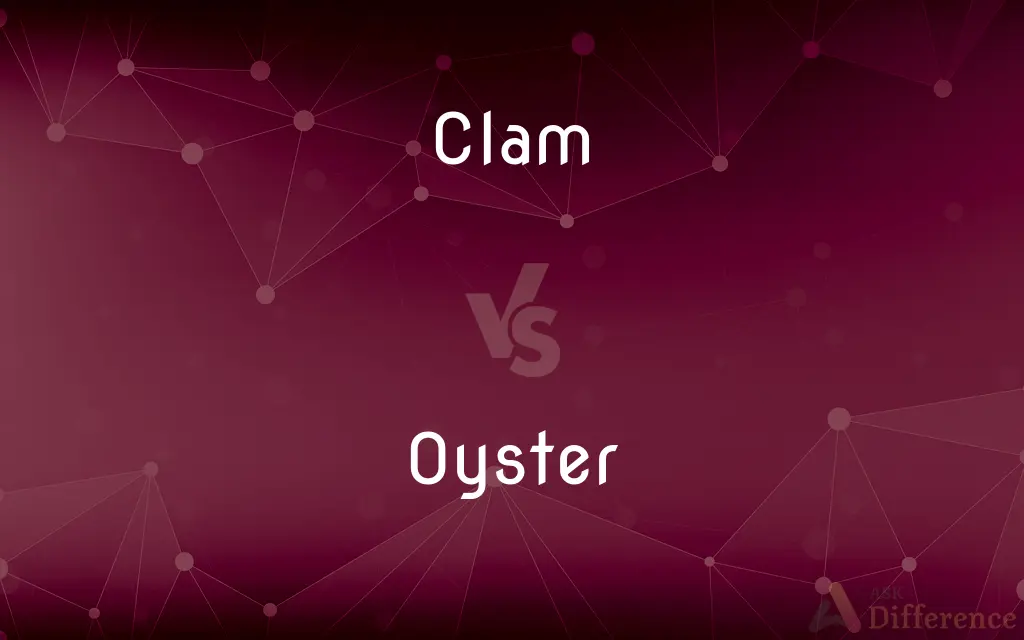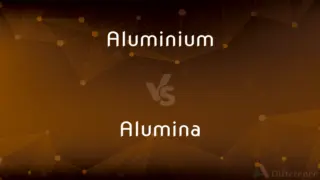Clam vs. Oyster — What's the Difference?

Difference Between Clam and Oyster
ADVERTISEMENT
Compare with Definitions
Clam
Clam is a common name for several kinds of bivalve molluscs. The word is often applied only to those that are edible and live as infauna, spending most of their lives halfway buried in the sand of the seafloor or riverbeds.
Oyster
Oyster is the common name for a number of different families of salt-water bivalve molluscs that live in marine or brackish habitats. In some species, the valves are highly calcified, and many are somewhat irregular in shape.
Clam
A marine bivalve mollusc with shells of equal size.
Oyster
Any of several edible bivalve mollusks of the family Ostreidae, having a rough, irregularly shaped shell attached to the substrate in shallow marine waters. Oysters are widely cultivated for food.
Clam
A dollar.
ADVERTISEMENT
Oyster
Any of various similar or related bivalve mollusks, such as the pearl oyster.
Clam
Dig for or collect clams
November is one of the worst times for clamming
Oyster
An edible bit of muscle found in the hollow of the pelvic bone of a fowl.
Clam
Abruptly stop talking
As soon as I ask if any of this can go on the record, he clams up
Oyster
A special delicacy.
Clam
Any of various usually burrowing marine and freshwater bivalve mollusks chiefly of the subclass Heterodonta, including members of the families Veneridae and Myidae, many of which are edible.
Oyster
Something from which benefits may be extracted.
Clam
The soft edible body of such a mollusk.
Oyster
(Slang) A close-mouthed person.
Clam
(Informal) A close-mouthed person, especially one who can keep a secret.
Oyster
To gather, dredge for, or raise oysters.
Clam
(Slang) A dollar
Owed them 75 clams.
Oyster
Any of certain marine bivalve mollusks, especially those of the family Ostreidae (the true oysters), usually found adhering to rocks or other fixed objects in shallow water along the seacoasts, or in brackish water in the mouth of rivers.
Clam
A clamp or vise.
Oyster
The delicate morsel of dark meat contained in a small cavity of the bone on each side of the lower part of the back of a fowl.
Clam
To hunt for clams.
Oyster
A pale beige color tinted with grey or pink, like that of an oyster.
Clam
A bivalve mollusk of many kinds, especially those that are edible; for example pl=s (Mya arenaria), hard clams (Mercenaria mercenaria), sea clams or hen clam (Spisula solidissima), and other species. The name is said to have been given originally to the Tridacna gigas, a huge East Indian bivalve.
Oyster
A person who keeps secrets.
Clam
Strong pincers or forceps.
Oyster
A shoplifter.
Clam
A kind of vise, usually of wood.
Oyster
Of a pale beige colour tinted with grey or pink, like that of an oyster.
Clam
A dollar.
Those sneakers cost me fifty clams!
Oyster
(intransitive) To fish for oysters.
Clam
A Scientologist.
Oyster
Any marine bivalve mollusk of the genus Ostrea. They are usually found adhering to rocks or other fixed objects in shallow water along the seacoasts, or in brackish water in the mouth of rivers. The common European oyster (Ostrea edulis), and the American oyster (Ostrea Virginiana), are the most important species.
Clam
A vagina.
Oyster
A name popularly given to the delicate morsel contained in a small cavity of the bone on each side of the lower part of the back of a fowl.
Clam
(slang) In musicians' parlance, a wrong or misplaced note.
Oyster
Marine mollusks having a rough irregular shell; found on the sea bed mostly in coastal waters
Clam
(informal) One who clams up; a taciturn person, one who refuses to speak.
Oyster
Edible body of any of numerous oysters
Clam
Mouth (Now found mostly in the expression shut one's clam)
Oyster
A small muscle on each side of the back of a fowl
Clam
Clamminess; moisture
Oyster
Gather oysters, dig oysters
Clam
To dig for clams.
Clam
To produce, in bellringing, a clam or clangor; to cause to clang.
Clam
To be moist or glutinous; to stick; to adhere.
Clam
To clog, as with glutinous or viscous matter.
Clam
Clammy.
Clam
A bivalve mollusk of many kinds, especially those that are edible; as, the long clam (Mya arenaria), the quahog or round clam (Venus mercenaria), the sea clam or hen clam (Spisula solidissima), and other species of the United States. The name is said to have been given originally to the Tridacna gigas, a huge East Indian bivalve.
You shall scarce find any bay or shallow shore, or cove of sand, where you may not take many clampes, or lobsters, or both, at your pleasure.
Clams, or clamps, is a shellfish not much unlike a cockle; it lieth under the sand.
Clam
Strong pinchers or forceps.
Clam
A kind of vise, usually of wood.
Clam
Claminess; moisture.
Clam
A crash or clangor made by ringing all the bells of a chime at once.
Clam
To clog, as with glutinous or viscous matter.
A swarm of wasps got into a honey pot, and there they cloyed and clammed Themselves till there was no getting out again.
Clam
To be moist or glutinous; to stick; to adhere.
Clam
To produce, in bell ringing, a clam or clangor; to cause to clang.
Clam
Burrowing marine mollusk living on sand or mud
Clam
A piece of paper money worth one dollar
Clam
Flesh of either hard-shell or soft-shell clams
Clam
Gather clams, by digging in the sand by the ocean
Share Your Discovery

Previous Comparison
Proteasome vs. Protease
Next Comparison
Aluminium vs. Alumina













































